- Home
- Evelyn Waugh
Helena Page 5
Helena Read online
Page 5
Light was failing; the crowd pressed close, peering between the guards; Helena saw little of Nish on her way from the waterfront. They went under an arch; through the windows of her chair and over the porters’ shoulders Helena caught glimpses of an arcaded street, of the bases of many fluted columns, of a thronged square and a line of over-sized, official statues; the scent of garlic and hot olive-oil, pierced with a sweeter breeze from the mountains; then she was set down and stepped from her close cabin into the vast, paved square of the barracks, bemusedly climbed the steps between ranks of guardsmen and entered her house where the lamps were already alight.
“I’m afraid you won’t have thought much of the turn-out,” said Constantius.
“I noticed nothing wrong.”
“They’re a shocking lot of men—nothing but recruits and the old sweats. Aurelian’s been bleeding us white, the last six months, for the army that’s forming for the Syrian campaign—draft after draft of our best men, over ten thousand of them. He’s promised them back but you can never tell. There’s nothing but a token force now between here and Trèves. We should look pretty silly if the Goths started anything. But they won’t. They’ve had something to remember too lately. If I have time tomorrow I’ll show you Uncle Claudius’s battlefield.”
He showed her the battlefield in arduous detail, the line where the legions had stood and broken under the Gothic charge, the gulley where Uncle Claudius had cleverly concealed his reinforcements and launched them on the enemy’s rear, the foothills where Uncle Claudius had rallied his shaken men, turned them and led them back to victory, the open fields where at length fifty thousand Goths had been splendidly massacred. The salvage had been patiently collected and between the unconsidered bones, the trampled vines, replanted, were even now being picked. “Grapes thrive on blood,” said Constantius.
He showed her, also, the principal beauties of the town, the statue of Uncle Claudius, seven and a half tons of Pentelic marble with bronze enrichments; it stood at the hub where all the roads of the province converged and met the great highway that led from the Rhine to the Euxine Sea; the more modest monument to Uncle Quintilius, a bust in the cooling-room of the public baths; the massive shrine and domestic altar of the Flavian family; the half-finished meat-market Constantius himself had planned—work had lagged there during his absence and was now furiously resumed; the courthouse where he gave judgment; the very chair he sat in on such occasions; his box at the theater.
Constantius was at home in Nish; here in his own command, among his own people, his precise speech betrayed the local burr, his manners at table became rougher, he laughed, mirthlessly but from a kind of contentment, at the jokes his subordinates made when they came to dine.
Various kin came to call from the surrounding hills; Helena often failed to follow their broken Latin. They commented coarsely on her now-evident pregnancy and, when these compliments were at an end, lapsed, with an air of physical ease, like a man unbuckling too tight a belt, into their mother tongue. Helena found none to love among them; they were a prosaic race; some farmed their ancestral holdings; some had profited by their high connections to the extent of small trade monopolies and sinecures; many of them had not yet troubled to adopt the fanciful new patronymic of “Flavius.”
The grapes were pressed, the leaf paled and fell, the first, premature snow melted as it touched ground; then after a few brumous weeks winter set in, hard and white, with cruel winds from the mountains. Helena patiently bore her growing burden, lay much indoors, borrowed the few rolls of poetry in the bank manager’s library, dreamed of Britain and the call of the hunting-horn in bare woods.
Four
The Career Open to Talent
Before mid-winter news came from the East; first by courier in a brief, official notification of victory; shortly afterwards at great length over the plum-wine from one of the countless military cousins, a cocksure young centurion of infantry on special leave from the field.
“It all went according to plan. Trust Aurelian. Our boys did most of the fighting as usual.”
“Did you see Zenobia?”
“Once, in the distance. She’s something very special I can tell you. Aurelian’s going to treat her soft, they say.”
“Why?” said Constantius.
“If you ask me the old boy’s breaking up a bit. He left Palmyra practically untouched. No massacre. No private looting. It didn’t go down any too well with the troops. He chopped the block off an old boy called Longinus.”
“Who was he?”
“Not the great Longinus, the philosopher?” said Helena.
“Something of the kind. According to Zenobia he was behind the whole trouble. Why? Do you know anything about him?”
“I used to, once.”
“I say,” said the kinsman, “you seem to have introduced a highbrow into the family. We shall have to watch our steps.”
“What can you possibly know about a philosopher?” asked Constantius Chlorus.
“Nothing much. Nothing at all really.”
Yet the death of this remote old man, whose books she had never read, struck another wound in Helena’s heart. He had joined the sapper-sergeant in the lost country of her British youth and it seemed that now, tragically, her education had come to its end.
“What about the triumph?” Chlorus was asking.
“That’s all set as soon as the troops can be moved. It’s a matter of transport. I wonder you aren’t going. All the big shots will be there.”
“I’ve heard nothing about it yet, officially.”
“He’s taking the whole army to Rome. I wish he wouldn’t. The boys’ll never be the same again.”
“Odd I haven’t been informed.”
“Well someone has to stay behind and do the dirty work I suppose. Besides, you weren’t actually in the campaign, were you?”
“No. No, I suppose not. All the same, I thought Aurelian would want me there.”
Constantius Chlorus fretted darkly for some days after this visit. Then the imperial courier arrived and his mood lightened; he was going to Rome. It was his first visit.
“Chlorus, I do wish I could go too.”
“That’s out of the question.”
“Oh, yes. I know it’s out of the question, but I’ve always so wanted to see a triumph.”
“There’ll be plenty more,” said Constantius.
“You’ll remember everything, won’t you, every detail, and tell me about it when you come back?”
“There’ll be a lot to remember if I know Aurelian.”
Helena cried that evening and half-grudged the child in her womb its life and power to hold her imprisoned. She cried again bitterly when Constantius and his small escort rode away through the snow; then she composed herself and bided her time.
Her child was born in the new year. Constantius had left orders that it was to be called Constantia if it were a girl, Constantine if a boy. It was a boy; a robust baby acclaimed by all its father’s kinswomen as notably handsome.
*
British mothers of the upper class followed the Gallic and Italian fashion and put their babies out to nurse; not so the Illyrians, as Constantius’s relations unanimously sought to inform Helena. She complied joyfully with this primitive usage; suckled her boy, crooned to him and deeply loved him.
She lived in the promise of Constantius’s return. So also did the cantonment and the neighboring countryside. Almost every family had a man in the army; many of them veterans of the Gothic wars, whose term of service was up, who had been looking forward to discharge and a bonus of land, when they were drafted East; some were young soldiers, newly married; the infant Constantine was one of a thousand babies in and about Nish whom their fathers had never seen.
Constantius returned with the spring when the plain was white with plum blossom. A courier came first with orders for his reception and inquiries about his son. Crowds pressed round the man in the courtyard asking news of friends and kinsmen, but he rode back into the
hills leaving them unanswered. A scare started in the garrison that something was amiss, that the army was being drafted East again, that there was plague in the column. No word of these rumors reached Helena. She nursed her baby, repeating over the cradle the message that in two days he would see his father.
When the day came she rode out to greet Constantius through the flowering orchards and vineyards, met him five miles up the road, turned and trotted home beside him. They spoke of Constantine and then he fell silent. Behind them, also silent, followed the vanguard of the Danubian army.
“Is anything wrong?” asked Helena.
“Yes. A misfortune. Nothing fatal. One of the things a soldier must expect.”
“Tell me.”
“Later.”
And they rode silently into Nish.
The news, and more than the news in a hundred fantastic distortions, spread through the town. To correct the rumors Constantius issued a proclamation. The truth was grave enough. Part sullenly, part in Balkan gusts of grief, the townspeople pulled down the flowery arches with which they had decked the street, and gave themselves up to mourning. That evening alone with Helena, Constantius at last gave way to his grief.
“Seven thousand of my best troops, men who fought with Uncle Claudius, the bone and soul of the province, cut to pieces in the streets, in the City… Some local grievance at the Mint, a townsman’s brawl… men who had fought three times their weight of Goths and Syrians, trapped and murdered in the slums by a rabble of slaves and circus hands…”
Bit by bit the grim story came out; the lax discipline after the Triumph, the soldiers pushing their way happily about the markets, collecting souvenirs, seeing the sights, boasting in the taverns and baths; then the sudden, concerted uprising against them of half the City… “What’s behind it? It wasn’t a mere riot. They were armed and trained for the job, backed with money. What are they after? There’s something we don’t understand, working underground, planning… Some say it’s the Jews. There are secret societies everywhere in Rome. You never know who you’re talking to; the man next to you at dinner may be a member. Every class is mixed up in it. Women, too. Slaves and eunuchs and senators. They’re out to destroy the Empire; God knows why. Aurelian says it’s the Christians… It none of it makes any sense.”
He spoke to Helena because she was his sole companion, but in his shame and perplexity he did not turn to her for comfort. He was not the man who had hopefully ridden out from Nish. In the days that followed, when the fatigue of the journey was forgotten and the first smart of loss dulled, and he was once more soberly and confidently calculating his chances of preferment, he was still a stranger to Helena. When he stood beside her as she nursed her baby, when he came to her bed, he was still a stranger. Rome, where all the treasure of the world flowed and was squandered, had despoiled Constantius. What he had ever had of youth was dried up now; whatever of love was all grown cold; that large shadow of him which Helena had glimpsed, pursued, briefly enjoyed, was lost forever. He was a man unschooled in courtesy; no inherited veil of kindliness hid his small, cold soul. Helena saw all this in the first days of his return and accepted it. Like the Spartan boy so often—so crassly it had seemed then—extolled to her in her childhood, she pressed the gnawing fox to her vitals and held him hid.
But because they were alone together evening after evening and his mind was shaken and clotted with the events at Rome, he talked long about them.
“The Triumph was something I shall never forget, something I could never have imagined.”
“Elephants?”
“Twenty of them and four tigers. Aurelian’s chariot had a four-in-hand of stags; there were ostriches and giraffes and animals there isn’t a name for, who’ve never been seen before. Zenobia came down on hands and knees once from the sheer weight of jewelry… Tetricus looking as pleased as though it was his triumph in mustard-colored breeches… Sixteen hundred gladiators. You never saw anything like it.”
“No,” said Helena, “never.”
“We had parties every night. All the biggest senators opened their palaces to us. They’re a queer lot. One of them collected mechanical toys they make for the harems in Persia. You couldn’t understand half they said. I felt sometimes they treated us as if we were part of the wild animals from the procession, but they gave us some staggering dinners. Everything was got up to look like something else, partridges made of sugar, peaches of mincemeat; you couldn’t tell what you were eating…
“The size of the place! You can stand on any of the hills and look round and as far as you can see there’s nothing but roofs. Great blocks of flats six and seven stories high; and hardly a genuine Italian in the place, every race and color under the sun. It shook the men, I can tell you.”
And at the end inevitably the conversation came back to its true course, Constantius’s career:… “For the first month I hardly saw Aurelian at all. He was with Probus all the time; a new man who’s been lucky in the East. I began to think he was avoiding me. Then after the Triumph was all over he called me in and we had a long talk. Everything’s going to be all right. He’s a great man, a second Trajan. He began by putting all the objections—the Senate were getting restive and thought we Illyrians were taking too much into our own hands; the army in the East didn’t know me, and so on. I thought he was working up to say he’d changed his mind. Then he said: ‘I’m telling you all this to show you your job isn’t going to be easy.’ No more than that but in his old quiet, friendly way. He had the proclamation made out for my appointment and another one outlawing the Christians. Then, if you please, a thunderbolt had to fall in his garden. He’s a queer, superstitious fellow. He began consulting a lot of fortune-tellers and put off signing anything. Then came that frightful rising in the City. After that he suddenly decided to go off to Persia. He says it’s to get back the body of Valerian, but if you ask me he’s afraid of the army. He’s got to keep them on the move and in action for fear of mutiny. I hoped he’d take me with him. I tried to see him again and again. Then just when he was starting he sent me a message. I was to come back to Nish. I wasn’t to worry. He had not forgotten me. So it’s just a matter of waiting again. It won’t be long this time.”
But the Divine Aurelian never came back. He had barely started when he was murdered by his staff on the shores of the Bosphorus. News of the event came swiftly to Nish and was received with lamentation as general and bitter as for their own kin. Constantius was dumbfounded and made no move. The whole army seemed momentarily shaken in its self-confidence. No general put himself forward. Month succeeded month and the Empire lay inert, without an Emperor. Then the Senate appointed one of themselves, a blameless elderly nobleman. There were no objections except from himself; he knew very well what it meant.
A few months passed and an Illyrian was again on the throne. Probus this time. Constantius patiently served, and advancing one lowly step in his ascent, went after a time as Governor to Dalmatia, while his rivals, Carus, Diocletian, Maximian, Galerius, clustered enviously round the seat of supreme power.
*
Constantine was just three years old when they moved to Dalmatia; sometimes for an hour or so he sat Helena’s saddle astride before her: at other times he traveled on a led-horse, wrapped in furs, in a basket specially contrived for him. He slept long and seldom complained, watching the passing scene with silent interest. Because of the snow they followed the circuitous route up the Danube and Sava and across the mountains by the gentler, northern pass. On the edge of the high, blind plain of the Lika they re-ordered the caravan, transferring their baggage from the ponderous military wagons to the light, big-wheeled carts of the country, engaging new guides and outriders and a local pioneer unit to go before them and clear the road.
Helena had left Nish without regret and she traveled forward without hope. They brought a sledge for her but she preferred to ride. Day by day they followed the brown ruts in the bland white surface. At the foot of the pass sledges were assembled from all the surroun
ding farms. The carts were driven up empty, left at the summit and the horses led back to drag the luggage, eight to a sledge with a dozen men about it, at the sides, at the back, at the horses’ heads, pushing and pulling and shouting, till all the baggage was up. Then Constantius broke camp, breakfasted and saddled by torchlight, was off at the gray of dawn and rode through in the day to the first frontier town of his new dominion.
The joy of that day’s ride took Helena unawares, so long had she ceased to look for it. All the morning they climbed; the baggage trains had worn the road bare and the horses stepped out firmly and bravely. The way ran zigzag through a forest of pine which the bitter wind, still that morning, had turned to ice; every bough was adorned with lines of stalactite which shivered and glittered in the morning sun; every needle had a brilliant, vitreous case and when she flicked her whip at a wayside shrub she brought down a tinkling shower of ice-leaves, each the veined impression of its crisp, green counterpart. The sun mounted with them and when, soon after noon, they reached the top of the pass and Constantius drew rein to inspect the loaded carts, Helena rode forward round a bare pinnacle of limestone, and came alone to an immense and splendid prospect.
The ice ended abruptly; six paces had borne her out of that soundless and scentless, lunar winter. Birds were in song all round her; the wooded hillside fell away, cleared and terraced on its lower slopes with vineyards and olive groves and orchards, while at its foot, far below, a river wandered through a rich landscape of villas and temples and little walled towns. Straight before her lay a primrose gleam of sunlit water, a line of purple and gray islands and beyond, above their crown, the single blue arch of the sea; and through the balmy smell of the woods her nostrils caught the distant, salt tang of the seaside, of her first home. She had her child with her. “Look, Constantine,” she cried, “the sea.” And the child, sensing his mother’s delight, clapped his hands and repeated, without meaning, “The sea. The sea.”

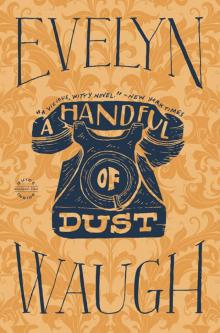 A Handful of Dust
A Handful of Dust Complete Stories of Eveyln
Complete Stories of Eveyln Brideshead Revisited
Brideshead Revisited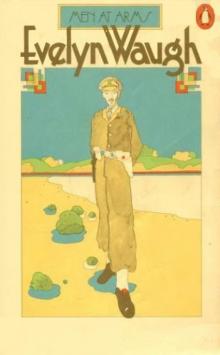 Men at Arms
Men at Arms Black Mischief
Black Mischief When the Going Was Good
When the Going Was Good Officers and Gentlemen
Officers and Gentlemen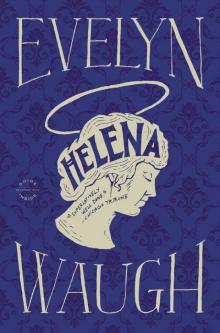 Helena
Helena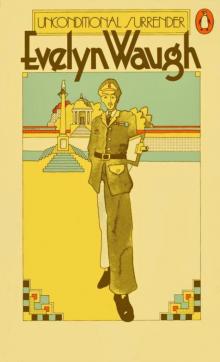 Unconditional Surrender
Unconditional Surrender The Ordeal of Gilbert Pinfold
The Ordeal of Gilbert Pinfold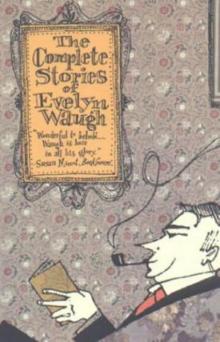 The Complete Stories Of Evelyn Waugh
The Complete Stories Of Evelyn Waugh